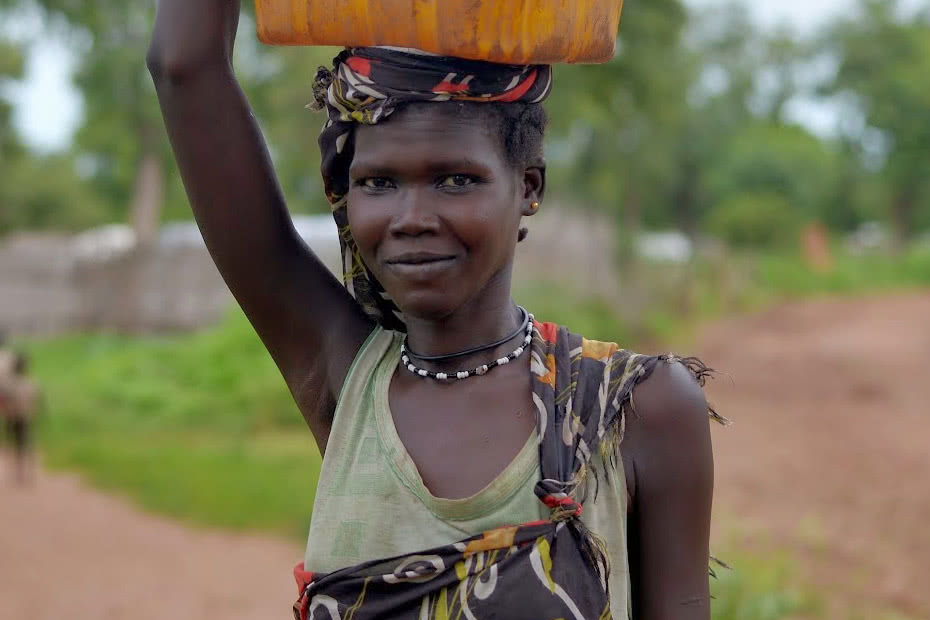Over six million South Sudanese, almost half of the population, are in need of humanitarian assistance.
Since the current crisis began in 2013, over four million South Sudanese have been forced to flee their homes, including more than two million now living as refugees in neighbouring countries. The United Nations (UN) estimates that about 7.1 million – almost two-thirds of the population – will go hungry this year without urgent humanitarian assistance.
Food, shelter, water and sanitation infrastructure, medical services and cooking and household supplies are all immediate needs, with women and girls at risk as they are outside the protection of their homes and cut off from traditional support systems.
Fast Facts
Population: 13.02 million (July 2017 est.)
Infant mortality: 62.8 deaths/1,000 live births (2017 est.)
Under-5 mortality*: 108 deaths/1,000 live births (2015 est.)
Maternal mortality: 789 deaths/100,000 live births (2015 est.)
Adult literacy rate: 27% (40% male, 16% female) (2009 est.)
Access to improved drinking water: 58.7% (66.7% urban, 58.7% rural)
Access to improved sanitation: 6.7% (16.4% urban, 4.5% rural)
Labour force participation rate^: 73% male, 70% female (2017 est.)
Percentage of seats held by women in national parliament^: 29%
GDP per capita: $1,500 (2017 est.)
Source: CIA World Factbook, *UNICEF, ^World Bank
Providing critical support
CARE has already provided emergency help to more than 324,000 people in desperate need. CARE-supported health facilities, including mobile health clinics, are providing lifesaving medical services in some of the worst affected areas of the country. Our medical aid includes nutrition support for malnourished children and pregnant women, and vaccinations to prevent the spread of diseases like cholera and malaria.
We are distributing seeds, tools and fishing kits to help families restore their crops and their livelihoods.
Inside UN bases, CARE is providing water, hygiene, nutrition and protection services. We are also working to reduce and prevent incidents of violence against women and girls.
You can help millions at risk of starvation by donating to our East Africa Hunger Crisis.

Improved health services
CARE has managed county hospitals and health clinics to help support the host communities in recruiting, paying and building the capacity of medical staff, and improving the infrastructure of the facilities. CARE also runs mobile health clinics in some of the hardest to reach areas of the country, where people have no other access to health services.
The health centres and clinics have provided lifesaving medical support including prenatal and postnatal care, sexual health screening and vaccinations for diseases such as measles and polio, to hundreds of thousands of people worst affected by conflict.

Improving food security and resources
With such widespread displacement, many people are unable to farm or access normal food sources, leading to drastically reduced food production. At the same time, prices have increased dramatically.
Seasonal dry weather means that water resources are severely strained, aggravating the already fragile food situation in the country.
CARE is providing crop kits, agricultural tools and fishing equipment, vegetable and tree seeds and cash vouchers to conflict-affected communities, to help improve food security and livelihoods.

Improved access to income
CARE has helped set up farmer associations and Village, Savings and Loans Associations (VSLAs) in conflict-affected areas where formal banking systems have shut down. This -enables access to an alternative source of capital and a means of saving.
Advice on high-value crops and market timings has been provided, as well as supporting income diversification away from agriculture and into activities such as carpentry and tailoring.

Donate now
Support our ongoing work to create a more equal world.
Your donation can help end extreme poverty and give people the means to build a better future for themselves in countries like South Sudan.
For those living in extreme poverty, your support brings education and training, healthcare and clean water, nutritious food, and new ways to earn an income. And in times of crisis, you help us deliver emergency relief. Please donate today.




